MercoPress. South Atlantic News Agency
Tag: Mauricio Macri
-
Friday, March 23rd 2018 - 09:06 UTC
Argentina expanded 2.9% last year; 2018 challenging given the persistent drought effect on crops

Argentina's economy expanded 2.9% in 2017 from the prior year and 3.9% in the fourth quarter versus the same period in 2016, the Indec statistics agency said this week. The year-over-year figure was slightly above the 2.8% annual growth rate given last month by Argentina's monthly economic activity indicator, seen as a proxy for gross domestic product.
-
Friday, March 16th 2018 - 10:18 UTC
Macri announces debt relief for farmers struggling with drought

Argentine President Mauricio Macri said the government would provide some debt relief to farmers struggling through what he described as the country’s worst drought in 40 years, which has resulted in dramatic cuts to soybean and corn crop outlooks.
-
Friday, March 16th 2018 - 10:06 UTC
Hammond and Johnson will be visiting Argentina
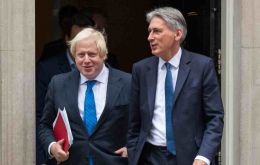
British Chancellor Philip Hammond and Foreign Secretary Boris Johnson are scheduled to visit Argentina as part of the G20 ministerial round of meetings in coming weeks, announced UK ambassador Mark Kent following talks on Thursday with foreign minister Jorge Faurie.
-
Tuesday, March 6th 2018 - 06:56 UTC
“Legacy” argument no longer stands for the Macri government, warns political analyst
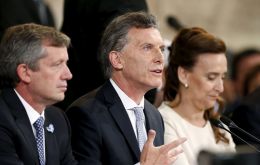
The argument of the “legacy” from the Kirchner years no longer stands, since normally on the third year of an elected government public opinion becomes more demanding, explained Argentine political analyst Rosendo Fraga commenting on the latest events in Argentina and the administration of president Mauricio Macri.
-
Monday, March 5th 2018 - 09:09 UTC
Macri's ¨coffin¨ and insulting songs MMSOB, the latest fad in Argentine football stadiums

The police of Argentina's second city, Rosario seized four cardboard “coffins” one of them with the name of president Mauricio Macri, before a football match of the Argentine premier league, involving one of the city's leading teams Rosario Central.
-
Saturday, March 3rd 2018 - 10:23 UTC
Macri confirms gradualist approach to economic reforms in speech to Congress
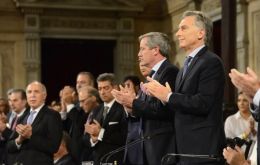
In his speech to Congress marking the opening of this year’s legislative session, Argentine president Mauricio Macri defended his business-friendly government’s so-called “gradualist” approach to economic reforms from critics who argue he should move faster to cut government spending and lower taxes in order to boost growth and attract investment.
-
Wednesday, February 28th 2018 - 09:56 UTC
Menem forecasts Peronism will rise from the ashes and be government in 2019

Former Argentine president Carlos Menem rated the government of Cristina Fernandez one, out of a scale of ten, and with a smile told a CNN interviewer that all Argentine governments had been exposed to corruption except his. He also anticipated that Peronism will “rise from the ashes” and return to government in 2019.
-
Tuesday, February 27th 2018 - 06:32 UTC
Argentina's foreign policy according to Jorge Faurie: Intelligent Insertion
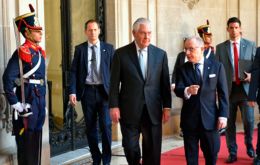
Argentina foreign minister Jorge Faurie has written a long column, (full tabloid page) in Buenos Aires daily Clarin, under the heading of “Intelligent Insertion” describing motives and objectives of the country's foreign policy under president Mauricio Macri, driven by the principle of an intelligent insertion in the international scenario. The final commitment of Macri's administration is reducing poverty and improving Argentines' life quality.
-
Friday, February 23rd 2018 - 09:13 UTC
Argentine farmers agree to pay royalties to seed companies like Monsanto
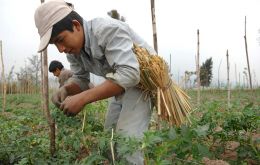
Argentine farmers have agreed to pay perpetual royalties when they replant genetically modified seeds made by companies like Monsanto Co, a deal that could allow farmers access to the newest biotechnology.
-
Thursday, February 22nd 2018 - 09:41 UTC
Argentine union leader Moyano remembers Macri where the real opposition stands
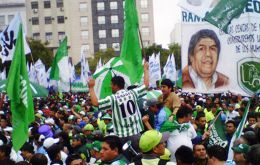
Argentina's teamsters powerful boss, Hugo Moyano supported by members from banks, judicial and teachers unions, plus social, picketers and left wing groupings, together with Kirchner followers marched on downtown Buenos Aires Wednesday evening for a huge rally to protest President Mauricio Macri's economic policies and attempts to reform labor legislation.
